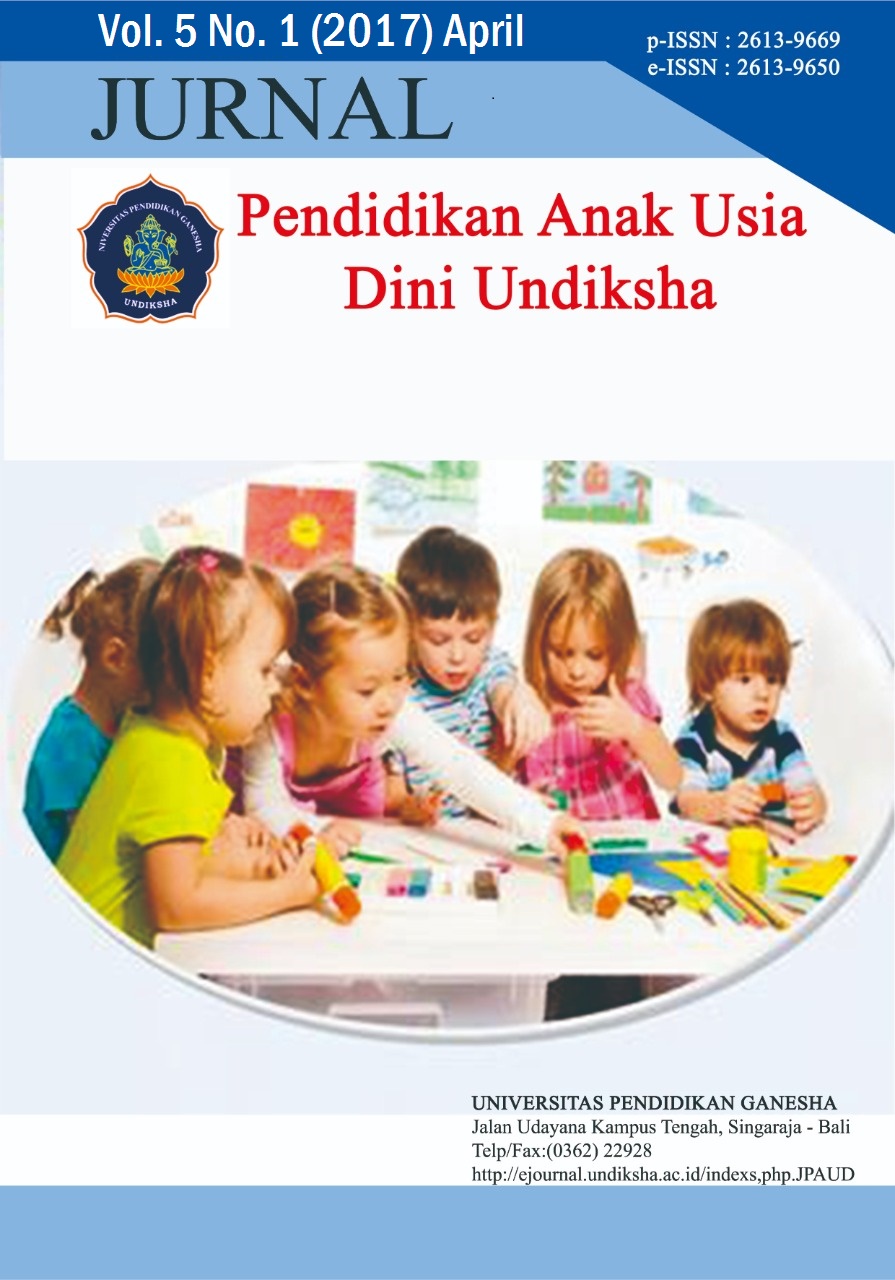Pengaruh Model Pembelajaran Behavioristik melalui Teknik Token Economy terhadap Perilaku Disiplin di Taman Kanak-kanak Gugus V Singaraja
DOI:
https://doi.org/10.23887/paud.v5i1.10979Abstract
Penelitian ini bertujuan untuk mengetahui perbedaan perilaku disiplin antara anak yang menggunakan model pembelajaran behavioristik melalui teknik token economy dan model pembelajaran konvensional. Penelitian ini tergolong quasi experiment dengan rancangan post-test only control group design. Populasi penelitian adalah anak kelompok B di Taman Kanak-Kanak Gugus V Singaraja Tahun Pelajaran 2016/2017 yang berjumlah 265 orang. Sampel penelitian ini dipilih dengan teknik random sampling. Data penelitian tentang perilaku disiplin dikumpulkan dengan metode observasi. Data yang dikumpulkan adalah data perilaku disiplin anak yang dianalisis menggunakan metode analisis statistik deskriptif dan uji-t. Hasil penelitian menunjukkan terdapat perbedaan yang signifikan perilaku disiplin anak yang menggunakan model pembelajaran behavioristik melalui teknik token economy dengan anak yang menggunakan model pembelajaran konvensional (Fhitung = 8,325 dengan sig = 0,05). Jadi dapat disimpulkan bahwa model pembelajaran behavioristik melalui teknik token economy berpengaruh terhadap perilaku disiplin anak kelompok B di Taman Kanak-Kanak Gugus V Singaraja Tahun Pelajaran 2016/2017 (Fhitung > Ftabel = 8,325>2,021).Kata Kunci : disiplin, model pembelajaran behavioristik, token economy
TThis study aimed at determining differences of disciplinary behavior between children using behavioristic learning model through token economy techniques and conventional learning model. This study was classified as quasi experiment with post-test only control group design. The population of the study was group B children in Kindergarten, cluster V, Singaraja in the Academic Year 2016/2017 in which the number of children were 265. The sample of this study was chosen by random sampling technique. The data on discipline behavior was collected by observation method. The data collection was children's discipline behavior in which the data was analyzed by descriptive statistical analysis and t-test. The result of the study shows that there are significant differences in the behavior of children's discipline using behavioristic learning model through token economy technique with children using conventional learning model (Fcount = 8,325 with sig = 0,05). Thus, it can be concluded that the behavioristic learning model through token economy technique affects the behavior of discipline of group B children in Kindergarten, cluster V, Singaraja in the Academic Year 2016/2017 (Fcount> Ftable = 8,325> 2,021).
keyword : disciplinary, behavioristic learning model, token economy
Downloads
Published
2017-07-20
How to Cite
Rianti, N. L. W., Jampel, I. N., & Ujianti, P. R. (2017). Pengaruh Model Pembelajaran Behavioristik melalui Teknik Token Economy terhadap Perilaku Disiplin di Taman Kanak-kanak Gugus V Singaraja. Jurnal Pendidikan Anak Usia Dini Undiksha, 5(1), 11–22. https://doi.org/10.23887/paud.v5i1.10979
Issue
Section
Articles
License
Authors who publish with the Jurnal Pendidikan Anak Usia Dini Undiksha agree to the following terms:
- Authors retain copyright and grant the journal the right of first publication with the work simultaneously licensed under a Creative Commons Attribution License (CC BY-SA 4.0) that allows others to share the work with an acknowledgment of the work's authorship and initial publication in this journal.
- Authors are able to enter into separate, additional contractual arrangements for the non-exclusive distribution of the journal's published version of the work (e.g., post it to an institutional repository or publish it in a book), with an acknowledgment of its initial publication in this journal.
- Authors are permitted and encouraged to post their work online (e.g., in institutional repositories or on their website) prior to and during the submission process, as it can lead to productive exchanges, as well as earlier and greater citation of published work. (See The Effect of Open Access)











